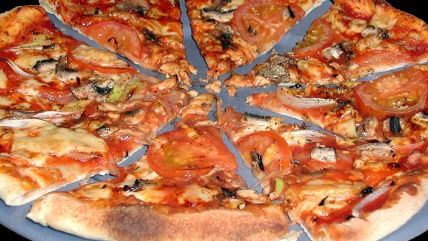One Pizza, With Extra Federal Handouts
The pork in your favorite pizza isn't just pepperoni.


The debt ceiling debacle may have come to an end for now, but wasteful federal spending is still a center-of-the-table issue, perhaps not unlike an extra-large pizza covered in government pork.
Take pepperoni, for example. Imagine that you're producing pigs, parts of whom are destined to be on top of pizzas nationwide.
Of course, most businesses operate under established economic laws. They produce enough to supply what demand there may be, and if they want to try to increase demand, they drum up business through the normal routes, like advertising. If they produce more than what the market demands, they shrink to better accommodate the circumstance.
Not so, though, if you happen to be in the business of producing pigs. In that case, the basic principles of a free economic system need not apply.
In fact, the federal government spends millions to bail out its friends in pork production—an industry notoriously resistant to even basic standards of ethical business conduct—divorcing pig production from actual demand. For example, when the industry took a hit from the all the swine flu media attention, TIME reported on the $30 million federal buy-up of surplus pork, noting, "If you're in prison, now might be a good time to develop a taste for pork."
Reason readers are likely already familiar with the perverse federal subsidy system that doles out billions to major agribusiness nationwide. When ag subsidies began, in the 1930s, then-Secretary of agriculture Henry Wallace called them "a temporary solution to deal with an emergency." That temporary solution has now lasted nearly a century, in both good and bad times for farmers, and even today when farm household incomes greatly exceed our national average.
But less well-known are the federal efforts to directly aid pork producers. The swine flu surplus buy-up was unfortunately not an isolated incident. In fact, when the country started experiencing drought, USDA stepped in to buy an additional $100 million of unwanted pork.
Were public school kids, service-members, prisoners, and other recipients of federally purchased food demanding more pig on their pizzas? No. Agriculture Secretary Tom Vilsack was clear about the motivation: "President Obama and I will continue to take swift action to get help to America's farmers and ranchers." No doubt many other industries wouldn't mind the administration paying them for products they're having a tough time selling.
And it's not just the pepperoni on the pizza getting a helping hand from Uncle Sam.
The dairy producers supplying that bed of cheese for our pizzas benefit tremendously from federally supervised programs that spend millions of dollars to "get people to eat more pizza." That's right. As the first lady encourages us to eat healthier and get active, the administration is at the same time signing off on a dairy checkoff program that spends millions urging Americans to pick up another slice of Three Cheese Stuffed Crust Pizza Extreme.
Do national pizza chains really need federal freebies? After all, as author David Simon points out in his new book Meatonomics, the dairy industry spends more on advertising in one week than the blueberry, mango, watermelon, and mushroom industries spend together in a year.
Ironically, despite their reliance on big government handouts, pork and dairy producers desperately fight any proposed rules governing their conduct, whether they relate to animal welfare, environmental protections, food safety or other issues that affect our society.
The meat and dairy industries may like to proclaim a libertarian mantra when it comes to regulation, but when they suffer from lack of demand, their clamor for socialism is stark. The industries consistently come to Congress with outstretched arms and cupped palms, seeking to defy the normal laws of economics that other businesses must navigate.
And make no mistake about it, this is a tasty deal for farm interests. When the auto industry got its federal bailout, serious strings were attached, like improving fuel efficiency and eliminating corporate jet budgets. But when the government subsidizes pork and dairy producers, for some reason, they don't have to pay taxpayers back, or give anything in return.
They just get a completely free lunch—pizza, most likely.


Show Comments (46)